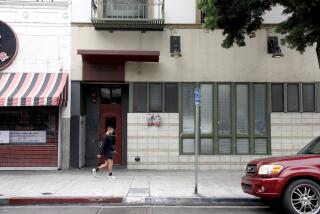Timely Moratorium
Los Angeles Mayor Tom Bradley and the City Council have approved an ordinance to shield scarce and inexpensive Skid Row hotel rooms from being demolished to make way for more profitable development. A single room with a bathroom down the hall might not sound like much, but it is all that thousands of poor, elderly and disabled renters can afford.
Skid Row’s single-room-occupancy hotels house an estimated 8,000 of the city’s poorest renters for as little as $8 per person per night. For most, the option is sleeping in a park or on a sidewalk.
An estimated 2,300 cheap rooms have been demolished or converted to other uses since 1969, years during which the housing crisis has grown to crisis proportions. The ordinance’s moratorium on demolition will protect the city’s poorest renters for five years, during which time a new emphasis at City Hall on housing may provide more long-term solutions. The new emphasis will require creation of a strong, independent housing commission and substantial new funding, some of which could be generated by fees on commercial development to be used for affordable housing near the central city.
The new measure allows owners who can make a case for extreme financial hardship to tear down their buildings, but they still would be required to find housing to substitute for each unit they destroy. The replacement provision is intended to guarantee that the limited supply of low-rent housing on Skid Row will shrink no further.
The moratorium adds no new housing, but it does buy time to expand the supply. Nonprofit developers, for example, can take advantage of new state housing funds that will be available in the coming months.
The five-year period was chosen because old hotels are being renovated and brought into compliance with earthquake standards at the rate of about 10 per year, a rate that could reach the 75 Skid Row hotels in five years.
An accompanying moratorium will protect single-room-occupancy housing in the rest of the city for one year with a possibility of renewal for three years. The city’s housing emergency makes the moratorium necessary until better ways can be found to preserve the most inexpensive rental housing.
The new moratorium, an extension of shorter and less stringent demolition bans, required the cooperation of the mayor, the council, the city attorney, the Planning Department, the Community Development Department and the city’s Community Redevelopment Agency. Councilman Mike Woo, the prime mover behind the tough five-year prohibition, deserves much credit for forging the important consensus.
Salvaging Skid Row’s limited housing supply is a tough but necessary task. A tiny room in an old hotel may not be much but it provides better shelter than a doorway or a sidewalk.
More to Read
Sign up for Essential California
The most important California stories and recommendations in your inbox every morning.
You may occasionally receive promotional content from the Los Angeles Times.






